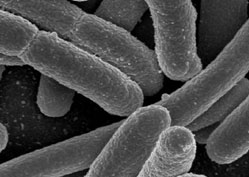
Researchers have engineered the harmless gut bacteria E.coli to generate renewable propane.
The development is a step towards commercial production of a source of fuel that could one day provide an alternative to fossil fuels.
Propane is an appealing source of cleaner fuel because it has an existing global market. It is already produced as a by-product during natural gas processing and petroleum refining, but both are finite resources. In its current form it makes up the bulk of LPG (liquid petroleum gas), which is used in many applications, from central heating to camping stoves and conventional motor vehicles.
In a new study, the team of scientists from Imperial College London and the University of Turku in Finland used Escherichia coli to interrupt the biological process that turns fatty acids into cell membranes. The researchers used enzymes to channel the fatty acids along a different biological pathway, so that the bacteria made engine-ready renewable propane instead of cell membranes.


